SUSTAINABLE LAND MANAGEMENT
SABUKO's rotational grazing methods to boost biodiversity and cut costs for Georgian shepherds PAGE 7
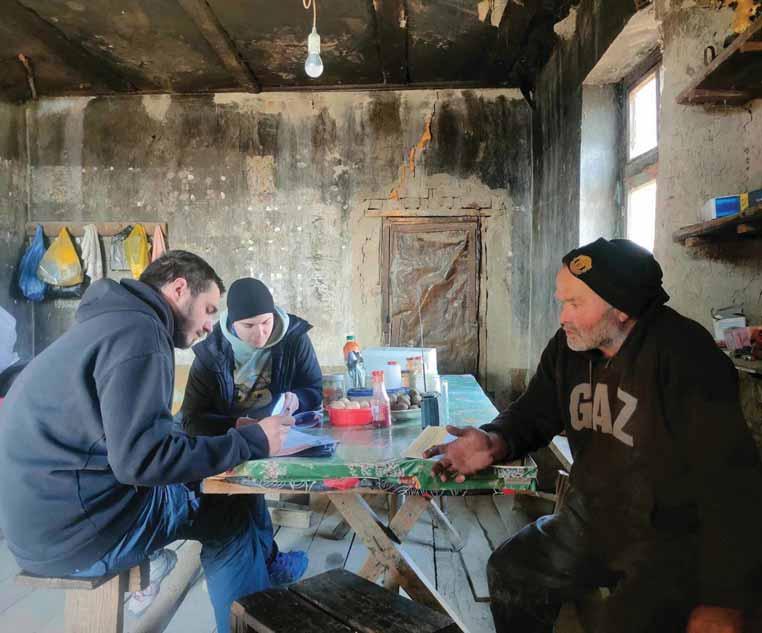
“We are acting like headless chickens” – Marcus Bensmann on Scholz and Germany’s Taurus Dilemma
INTERVIEW BY VAZHA TAVBERIDZE
Marcus Bensmann, a seasoned journalist, has spent two decades covering Central Asia, the Caucasus, Afghanistan, Iran, and Iraq for German, Swiss, and Japanese media outlets. His reporting has covered such issues as abuse of power, corruption, and the troubling alliances between the German government, the EU, and authoritarian regimes in the region. His critical stance has resulted in him being barred from working in Uzbekistan, Tajikistan, and Turkmenistan. Despite these restrictions, since 2014, Bensmann has been dedicated to exposing various clandestine activities for CORRECTIV. His investigations have ranged from the tragic downing of flight MH-17, to uncovering the funding sources of the far-right German political party AfD and revealing instances of counterfeit cancer medications.
Radio Free Europe/RFL’s Georgian Service sat down with him to recap what was an extraordinary week for Germany.
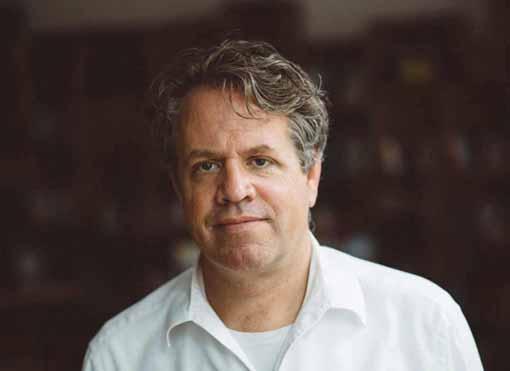
PRICE:
In this week’s issue...
Ukraine Latest: Germany Accuses Russia of ‘Information War’ after Military Recording Leak, Indians Allegedly Forced to Fight for Russia
NEWS PAGE 2
Save the Date: March 17 is Berikaoba!
NEWS PAGE 3
President Vetoes Changes to Election Code
POLITICS PAGE 4
Georgia Introduces Amendments to the Law of Georgia on Personal Data Protection
BUSINESS PAGE 6
EU-Supported Reforms Help Reduce Energy Poverty in Georgia
SOCIETY PAGE 8
Turkish Embassy Organizes Mosaic Art Exhibition
CULTURE PAGE 11
Georgian Poets: Lado Asatiani’s “In Georgia”
CULTURE PAGE 11



PreparedforGeorgiaTodayBusinessby Issue no: 1440 • • MARCH 8 - 14, 2024 • • PUBLISHED WEEKLY
GEL 2.50
Continued on page 5
Marcus Bensmann. Source: RFE/RL
ON
FOCUS

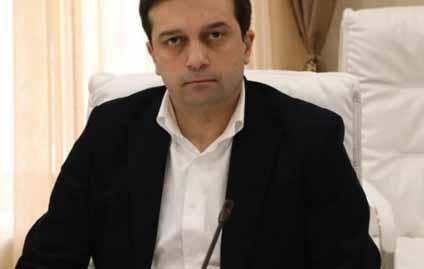
Georgian Ombudsman Calls for Preservation of Constitutional Rights in LGBT-related Draft Law
BY ANA DUMBADZE
The Public Defender of Georgia, Levan Ioseliani, has emphasized the importance of ensuring that any draft law related to the LGBT community does not infringe upon fundamental rights enshrined in the country’s constitution.
While withholding judgment until the details of the proposed legislation are revealed, Ioseliani underscored the need to safeguard principles of equality and freedom of expression.
“It will be difficult for me to assess the content of the draft law in advance, but one thing is clear, it should not contradict the basic rights guaranteed by the Constitution of Georgia. It should protect the principle of equality and not limit the freedom of speech and expression.
I am waiting for the draft law, and after getting familiar with it, I will be able to assess the details,” he noted.
The parliamentary majority is working on a draft law related to the LGBTQ community, which they plan to submit to the parliament within two weeks. As stated in the majority, the bill serves to protect society from “pseudo-liberal values” and “LGBT propaganda”.
GTI Ranks Georgia Among ZeroTerrorism Countries
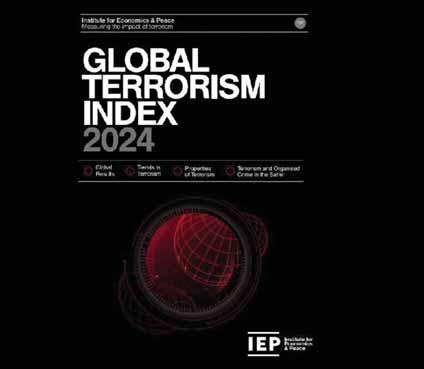
The Institute for Economics & Peace (IEP), an independent, non-partisan, nonprofit think tank, published the 2024 Global Terrorism Index (GTI), in which Georgia is named among the zero-terrorism countries and ranks the last (89th place) among 50 countries.
The report mentions that the situation in Georgia in terms of threats of global terrorism improved by 2,629 points in 2013-2023. According to the 2012 report, Georgia was ranked 41st.
The authors of the report say that, globally, overall, deaths from terrorism rose to 8,352 in 2023, a 22% increase from the prior year. The number of terrorist attacks decreased to 3,350 in 2023, a reduction of 23% from the 4,321 attacks in 2022.
Pakistan recorded the most incidents
Ukraine Latest: Germany Accuses Russia of ‘Information War’ after Military Recording Leak, Indians Allegedly Forced to Fight for Russia
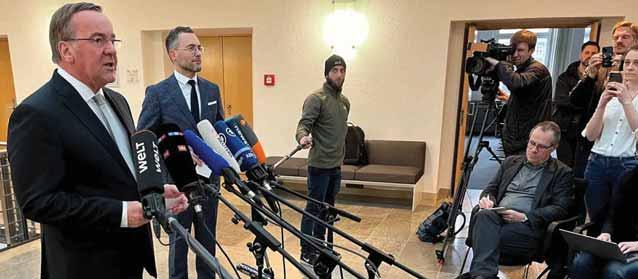 Source: Reuters
COMPILED BY ANA DUMBADZE
Source: Reuters
COMPILED BY ANA DUMBADZE
British soldiers are “on the ground” in Ukraine helping Kyiv’s forces fire long-range Storm Shadow missiles, Russian media revealed this week following the leak of a top-secret call involving German air force officers.
The Kremlin said the move demonstrated the direct involvement of the “collective west” in the war in Ukraine, while former British defense ministers expressed frustration with the German military in response to the revelations.
Released on Friday by the editor of the Kremlin-controlled news channel RT, Margarita Simonyan, the audio recording, confirmed as authentic by Germany, captures Luftwaffe officers discussing how Berlin’s Taurus missiles could be used to try to blow up the Kerch Bridge connecting Russia with occupied Crimea.
During the conversation, Lt Gen Ingo Gerhartz, the head of the Luftwaffe, describes how Britain is working with Ukraine on deploying Storm Shadow missiles against targets up to 150 miles behind Russian lines.
“When it comes to mission planning,” the German commander says, “I know how the English do it, they do it completely in reach-back. They also have a few people on the ground, they do that.
The French don’t.”
Reach-back is a military term to describe how intelligence, equipment and support from the rear is brought forward to units deployed on the front, but Gerhartz suggests the British approach is deeper, involving support on site.
Britain has been urging Germany to supply long-range Taurus missiles to the Ukrainian military despite the embarrassing leak of the top-secret call involving German air force officers. However, the German Chancellor, Olaf Scholz, said on Monday he would not donate missiles that could strike at the strategic Kerch Bridge linking Russia and occupied Crimea.
ANOTHER RUSSIAN WARSHIP
SUNK IN BLACK SEA, SAYS UKRAINIAN INTELLIGENCE
A Russian warship in the Black Sea, the Sergei Kotov, was sunk by Ukrainian special forces, Ukraine’s defense intelligence directorate announced Tuesday morning. “On the night of March 4-5, the special unit of the GUR of the Ministry of Defense of Ukraine ‘Group 13’ attacked the patrol ship of the Black Sea Fleet of the Russian Federation ‘Sergei Kotov’ … As a result of the attack by Magura V5 naval drones, the Russian ship of project 22160 ‘Sergei Kotov’ suffered damage to the stern, right and left sides. The ‘Kotova’ was damaged by fire in the territorial waters of Ukraine, near the Kerch Strait. The cost of the sunken ship is about 65 million dollars.”
The claim from Ukraine came after the Kerch Bridge, which runs from Russia to illegally occupied Crimea, was reportedly closed to traffic overnight and explosions were reported in the area. Social media channels suggested Ukrainian aerial and/or naval drone attacks had taken place. The announcement by Ukrainian intelligence appeared to confirm events.
attack on the Black Sea port city of Odesa on Wednesday.
Five people were killed in the strike and more were wounded, a spokesperson for the Ukrainian Navy, Dmytro Pletenchuk, told CNN, though neither Zelensky or Mitsotakis were injured.
Zelensky frequently makes high-risk trips to the front lines, and has welcomed dozens of world leaders to Ukraine over the more than two years of war with Russia, but Wednesday’s attack may represent one of the closest calls for the president. The strike’s proximity to Mitsotakis - the leader of a NATO member state - also underlines the dangers of such visits and potential global repercussions of the conflict.
Zelensky said he was close enough to see and hear the strike.
“We saw this strike today. You can see who we are dealing with, they don’t care where they strike. I know that there were victims today, I don’t know all the details yet, but I know that there are dead and wounded,” Zelensky said from Odesa on Wednesday.
“We need to defend ourselves first and foremost. The best way to do that is with an air defense system,” he added.
RUSSIA “KIDNAPS” INDIAN TOURISTS AND FORCES THEM TO ENLIST IN UKRAINE WAR
of any country, with 490 attacks recorded.
The rise in deaths but fall in number of incidents shows how terrorism is becoming more concentrated and more lethal.
The number of countries recording a death from terrorism fell to 41, considerably lower than the peak of 57 countries recorded in 2015 and the 44 recorded in 2022.
Israel had the largest increase in terrorism deaths, increasing from 24 to 1,210. The attack in Israel by Hamas was the single largest terrorist attack since the inception of the GTI, the biggest since 9/11, and one of the largest terrorist attacks in history. The Islamic State (IS) and its affiliates remained the world’s deadliest terrorist group in 2023, despite deaths attributed to the group and its affiliates declining by 17% from 1,963 to 1,636 deaths.
The Kremlin spokesperson, Dmitry Peskov, said the leaked conversation “once again highlights the direct involvement of the collective West in the conflict in Ukraine,” although on Sunday Germany’s defense minister, Boris Pistorius, accused Moscow of waging “an information war” against the West.
The authenticity of the 38-minute conversation, which took place a fortnight ago on the relatively insecure Webex platform, is not in doubt. It appears to have been hacked and recorded by Russian actors who passed it on to the editor of RT to release on Telegram on Friday.
Germany’s defense minister said on Sunday that Russia was conducting an “information war” aimed at creating divisions within Germany and called it an apparent act of eavesdropping and said it was investigating.
Russia launched 22 attack drones against Ukraine, with air defense systems destroying 18 of them over the Odesa region, Ukraine’s air force said on Tuesday morning.
Ukraine’s military said it contained a Russian advance outside Avdiivka, the city captured last month, but Russian troops were regrouping further south around Novomykhailivka. Ukraine’s emergency services reported that two firefighters were killed near the eastern Ukrainian town of Kramatorsk, north of Avdiivka, when they came under Russian shelling at the scene of a fire.
RUSSIAN MISSILE EXPLODES JUST 500 METERS FROM PRESIDENT ZELENSKY AND GREEK PM KYRIAKOS MITSOTAKIS
A Russian missile exploded just 500 meters from Ukrainian President Volodymyr Zelensky and Greek Prime Minister Kyriakos Mitsotakis during a deadly
Seven Indian citizens say they went to Russia as tourists in late December 2023 but were tricked by a Russian guide into traveling to Belarus, where they were arrested for being in the country without visas and deported to Russia, where they are now being forced to fight for Russia in Ukraine. According to the men, they were made to sign some documents without a translator present and ended up at a military training site.
One of them, a 30-year-old Indian man identified as Mohammed Asfan, died in Russia, officials said on Wednesday. Indian officials have not provided any details on the circumstances of his death.
Last week, Ministry of External Affairs spokesperson Randhir Jaiswal said in New Delhi that authorities are trying their best to secure an "early discharge" of around 20 Indian nationals who are working as “support staff to the Russian army.”
Jaiswal said, "It is our understanding that there are some 20 Indians who have gone there to work as support staff or as helpers with the Russian army. We are trying our level best for their early discharge."
Jaiswal had said that the Indian citizens had contacted the Indian embassy in Moscow.
GEORGIA TODAY MARCH 8 - 14, 2024 2 NEWS
German Defense Minister Boris Pistorius makes a statement in Berlin, Germany, March 3, on the apparent eavesdropping incident.
Public Defender of Georgia, Levan Ioseliani
Save the Date: March 17 is Berikaoba!
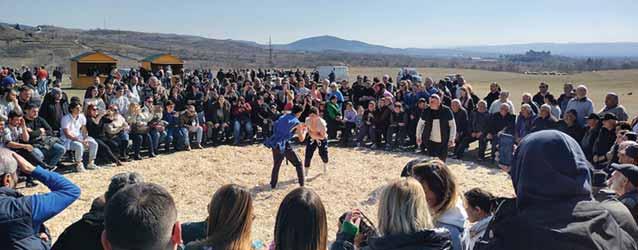 BY KATIE RUTH DAVIES
BY KATIE RUTH DAVIES
Didi Chailuri is a typical, unassuming Georgian village, one that grew along the slope of a rolling hill near Sagarejo, centered around a small church and stretching down into the valley and toward the ruins of a castle beside the highway leading to Kakheti.
But Didi Chailuri has a surprise – every year it hosts a pagan celebration of wild men dressed as monsters, who whoop,
scream and dance their way along the streets, throwing mud, accepting gifts from the neighbors, and beating back the crowds as they make their way to a wrestling ring and community fairground for drinks and musical fun. This is Berikaoba, and we highly recommend you attend!
Berikaoba is a traditional public holiday that originated in pagan Georgia. Unfortunately, Georgian history books have very little information about the tradition, or precisely when it started, and some suppose it is over 2000 years old. Initially, it was a fertility ritual, and the Berika costumes incorporated
hanging phallic forms. However, the theme, costumes, customs, and procession have changed over time, today being much more playful and familyfriendly.
“In the modern day, Berikaoba is an agricultural holiday connected with and celebrating the arrival of spring. In Didi Chailuri, Berikaoba is held on the last day of the Cheesefare Week,” says Eka Chikadze-Veshapidze, a resident of Didi Chailuri, history teacher, and the main organizer of Berikaoba. She notes that, back in the day, it was celebrated all over the country, yet only around five villages keep the tradition today.

“The reason we keep Berikaoba alive in Didi Chailuri is probably our attachment to the Georgian identity. I’m a historian by profession, and I value the history and the path Georgians have taken to get where we are today. I want the next generation to walk firmly in the footsteps of their ancestors,” Eka explains, adding that she feels responsible for maintaining this non-material cultural heritage.
Visitors can expect to be treated to local wine, music, cheese, barbecued meat, nuts, grapes and a special local version of Kada. Guests can get involved in making and cooking the Kada, as well
as making Churckhela (Georgian snickers), and stirring (and eating) the grape sauce Tatara.
A great day out for the whole family, you'll want to get there early as the Berika begin their parade at the tiny village church at 11am. Bring clothes you don’t mind getting muddy, some water to drink, and some money to donate – the event is free, but your generous donations will help to keep the tradition alive!
To find out more about the event, check out our review of Berikaoba 2023 here: https://georgiatoday.ge/berikoaba-georgias-ancient-fertility-festival-still-goingstrong/ See you there!
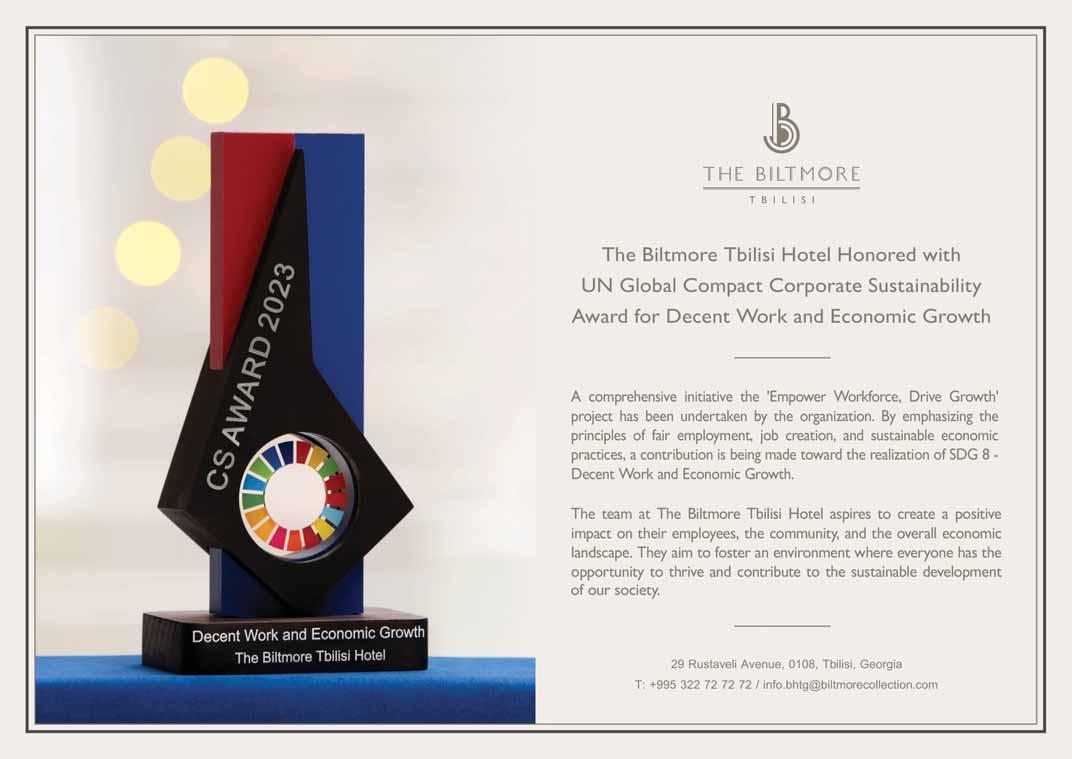
GEORGIA TODAY MARCH 8 - 14, 2024 3 NEWS


President Vetoes Changes to Election Code
BY ANA DUMBADZE
President Salome Zurabishvili vetoed amendments to the Election Code of Georgia recently passed by Parliament.
The President’s 11-page motivated remarks have been submitted to Parliament, and she explained them referring to the OSCE/ODIHR recommendations.
Among her remarks, she says that, based on the amendments, the President’s role in presenting candidates for chairperson and members of the Central Election Commission (CEC) remains
limited. She notes that adding a passage to the February 20 legislative amendments that “if parliament fails to elect a candidate twice consecutively, once by 3/5 and then 1/2 of the majority, and then hands the issue to the president,” does not increase the President’s quality of involvement, since it is unlikely that parliament will not be able to elect a candidate.
President Zurabishvili proposes announcing an open competition for the post of CEC Chair and members before May 1, 2024, whose 6-month and 5-year duty terms have expired. She also suggests establishing a competition commission to proceed with relevant procedures.
PM Kobakhidze: The EU Prevents Us from Maintaining 85% Support for the EU
BY ANA DUMBADZE
Prime Minister Irakli Kobakhidze on March 1 said the executive structures of the European Union should separate themselves from the “unfair decisions” of the European Parliament.
Kobakhidze responded to the amendment made in the European Parliament’s annual report on foreign and security policy by the initiative of deputy Anna Fotyga, which calls for the release of expresident Mikheil Saakashvili.
Kobakhidze claimed that, especially in 2022, unhealthy views towards Georgia had been seen in the European Parliament, on which the President of the European Parliament, Roberta Metsola, had “expressed a very healthy position” at a closed meeting with representatives of the Georgian government. Kobakhidze said he hopes that repeating old precedents on the part of the European Parliament will not become a trend.

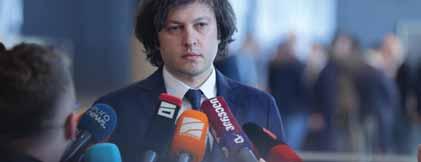
“The executive structures of the European Union should distance themselves from the European Parliament in such unfair decisions – I would reverse the call: help us so that we can help,” he said, going on to claim that “someone is trying” in the European Parliament to artificially lower the 85% support rate of Georgian society towards European integration.
Kobakhidze highlighted that if the executive structures distance themselves from the unjust statements of the European Parliament, it will only have a positive impact on public perception.
“I think it would be very good if the
executive structures of the European Union distanced themselves from the European Parliament in such unfair decisions. First of all, this will have a positive impact on public perception. The 85% public support for EU integration in Georgia must remain strong. We are doing our best to better this, but the European Parliament is preventing us from doing so. Our call is – help us so that we can help. If the European Parliament does not help us, it will be difficult for us to help them. I will repeat once again, our task is to maintain the high public support for EU integration as much as possible,” Kobakhidze said.
Georgia's Reformatted Foreign Policy: For Greater Practicality, for Greater Effectiveness. Part 2.
ANALYSIS BY VICTOR KIPIANI, GEOCASE CHAIRMAN
In the past, we have devoted several publications to the functional and structural reorganization of the Georgian foreign affairs agency.
This is one big topic, the importance of which goes far beyond diplomacy and is directly and immediately related to ensuring the country's effective national security and reputation. This time we want to discuss only those characteristics that we consider appropriate in the development and implementation of Georgia's foreign policy. We would like to add that such appropriateness does not fall only into the frame of "want or don't want". The point is that it is dictated by the very modern realities that we briefly discussed at the beginning of the article (see last week’s issue of GT).
FLEXIBILITY AND ADAPTABILITY NEEDED TO ADAPT GEORGIA'S FOREIGN POLICY TO REGIONAL OR GLOBAL CHALLENGES
We have already mentioned the excessively transactional nature of international relations. The most important characteristic of this approach, as in business, is to make a concrete decision on a concrete issue taking into account the so-called "costs and benefits". At the same time, it is equally possible that such a decision could change as a result of a change in the views of a political leadership or their expectations of diplomacy. We should remember and know this and should not be surprised. Moreover, the Georgian approach should be based on the same principle, which includes a correct reading of "our" and "their" practical needs and a mutually beneficial overlap. This is the handwriting suggested by the egoistic environment around us, in which necessity and practicality dominate over futile idealism and useless romanticism.
REAL OPPORTUNITIES POLICY
What is known in political science as realism, for us it is the politics of seeking and exploiting real opportunities. Such a policy requires a rational perception of the regional or global contradictions around us and, as a result of the proper management of such contradictions, manifests itself in practical results useful to us. In other words, the existing
contradictions should not alarm us, should not frighten us. On the contrary, we should use them as an opportunity to realize our interests through their mutual balancing and opposition.
At the same time, in order to identify realistic policy opportunities, we believe it is organically necessary to:
"DESENTIMENTALIZE" THE IMMEDIATE PROCESS OF FOREIGN POLICY MAKING, WHETHER COVERT OR PUBLIC
In other words, practical results require practical and sometimes unpopular methods and steps. Their only justification and measure is a tangible result, and the biggest obstacle to such a result is our own stereotypes or archetypes. We believe it is mandatory to get and understand the stereotypes or archetypes of the other side (regardless of whether it is a friend or an enemy). We talked about this in detail when, while discussing the forms of actual Georgian diplomacy, we considered the so-called diplomacy of empathy.
Since we have mentioned the stereotypical vision, let us express some opinions about those aspects that have a significant impact on the foreign policy of our allies and partners today, and if they are not taken into account, Georgia's foreign policy vector will lose its much needed practicality. In particular, we are talking about the fact that:
THE FOREIGN POLICY OF THE CURRENT STAGE HAS COME UNDER PARTICULAR PRESSURE FROM THE DOMESTIC POLITICAL CONJUNCTURE
The process of principal foreign policy decisions is practically governed by the mood of the electorate of a particular country and, accordingly, by the need for power. Moreover, in many countries of interest to us, the substantive side of the process has shifted from populism to radicalism, and from ethno-nationalism almost to extremism.
Since we have mentioned the dominance of nationalism in foreign (and not only) political handwriting, it is impossible not to mention the "rationales" that are sometimes skillfully and sometimes not so skillfully used by practicing politicians:
(a) an emotional element manifested in national unity and civic mobilization in making and implementing controversial decisions;
(b) a political element indicating a high willingness to address the existing prob-

lem; and
(c) an element of policy-making itself that helps maximize state opportunities and multiply resources. We believe that by reasonably gathering and incorporating these elements into Georgia's political line, we must have a realistic expectation that the other side will also utilize them.
ADAPTATION TO THE BALANCE OF POWER AND TIMELY READJUSTMENT WHEN IT CHANGES
The global balance of power between geopolitical centers requires constant professional observation and impartial, unbiased assessment. Here too, the manipulation of propaganda clichés and outdated stereotypes aimed at one's own constituents or external audiences should be a thing of the past.
At the same time, regardless of whatever shift in the balance of power, we believe that the Georgian foreign policy will still have clear priorities in the near and mid-term future as a constant:
(a) continuous development of bilateral relations with the U.S. as a strategic ally to introduce new opportunities and new formats of cooperation;
(b) "export" of European political culture and values to Georgian reality and integration into political Europe through real actions;
(c) an established working relationship with China, subject to the necessary predictability of its results;
(d) managing relations with Russia, whether in an anti-crisis, crisis or postcrisis situation.
It is also clear that however great and sincere our desire to master the creation
of such a political line, it must be based on at least two basic premises, namely:
(1) an economically self-sufficient national system and (2) the deparatization and "disintoxication" of foreign policy by infusing it with intellectual content, meritocracy, and competence.
THE REGION FACTOR IN THE BIG FOREIGN POLICY PICTURE
We have already talked about the role and significance of regional processes in the wide format of Georgia's foreign policy. There would probably be no need to mention this aspect again if it were not for the complex knot of South Caucasian geopolitical and geo-economic interests.
At the same time, it is precisely this complex regional background that gives us a unique opportunity to assert our role in the South Caucasus as an integral part of the wider Black Sea region, which will contribute to the competitiveness and capacity of the Georgian state, i.e. its functionality and effectiveness. The realization of this in Georgian politics has been taking place already in the 1990s and has been reflected in practical solutions. However, the achievements of the past are no longer sufficient today, and they will be completely nullified tomorrow if we do not constantly act to update this function.
To use a famous phrase of a famous politician, our task should be to become an "indispensable nation" in a wide region which means that the country should become not only one of the hubs of transport routes, but also a center of knowledge about the region for the rest of the world, a "soft power" in terms of disseminating best practices and stand-
ards, a diplomatic arbiter or mediator to resolve conflicting interests. It is to this task (and not to the misunderstanding we see) that the national energy and corresponding material resources should be directed. This work should have been started yesterday, so that tomorrow it would not be futile.
Therefore, the redistribution of power at the junctures of West and East or North and South on a global scale is still an ongoing process and will continue until the world international system finds a new "balance point."
Given the existing difficulties and high degree of unpredictability, the foreign policy of our country should clearly outline conceptually its own, so-called "Georgian Path".
In transforming the views and recommendations expressed in this article into practical solutions and actions, it is the conceptually renewed approach that should sensibly and comprehensively address global and regional contradictions. Moreover, with their qualified understanding (and, obviously, the growing institutionalization of the Western vector in the internal and external lines) and the support of the modern political (non-existent?) elite, Georgian public diplomacy should assert its multi-priority in external positioning. It is a fact that the country is faced with a demand for the creation of a new type and spirit of politics, which, among other things, requires radical personnel, structural and functional reorganization of the country's foreign policy agency. Without fulfilling this demand, the modernization of the Georgian state in a democratic regime will remain an unfulfilled Georgian dream for a long time to come.
GEORGIA TODAY MARCH 8 - 14, 2024 4 POLITICS
President of Iceland Welcomes Georgia’s NATO Integration Aspirations, Pledges Support
BY TEAM GT
President of Iceland Guðni Th. Jóhannesson was in Georgia for an official visit this week.
Foreign Minister Ilia Darchiashvili and Head of the President’s Administration Natia Sulava met the high-ranking guest at Tbilisi International Airport before taking him to an official hosting ceremony at the Orbeliani Presidential Palace.
Within the framework of his visit, President Jóhannesson held one-to-one and extended meetings with Georgian President Salome Zurabishvili, Prime Minister Irakli Kobakhidze, and Parliament Speaker Shalva Papuashvili. His visit also included a trip to Georgia’s occupation line bordering “South Ossetia”.
After the face-to-face meeting of the presidents, a briefing was given.
“Georgia has great potential and we are ready to cooperate with the country,” said President Jóhannesson. “Thank you, Mrs. President, for hosting us in this beautiful country of Georgia. For a very long time, it was my dream to visit Georgia. I met the Georgian people for the first time in 1990, before the collapse of the Soviet Union. I was teaching at one of the English universities and I met
Georgian students there.
“Georgia has great potential and we are ready to cooperate. When we talk about bilateral relations, we fully support Georgia in this regard. We also welcome the role of Georgia in joining the Euro-Atlantic Alliance and are ready to support it,” he said, emphasizing the need to support small countries and to condemn any aggression against them.
“Iceland and Georgia are very small countries, and so it is necessary for us that international law be respected. Iceland has condemned Russia’s aggression in Ukraine from day one, and has offered to help Ukraine. We received displaced people from Ukraine in Iceland. In this process, we realized that it is necessary to show support to Russia’s neighboring countries and to condemn any aggression,” Jóhannesson noted.
President Zurabishvili highlighted that President Johanneson's visit coincides with a very significant time from a geopolitical point of view.
"This is a very important moment for the European future of Georgia, as well as for the peace and stability of the region and Europe as a whole. By being accepted as a candidate, Georgia has taken a historic step and is preparing for the equally important step of opening accession negotiations,” she said.
“The current period is very important
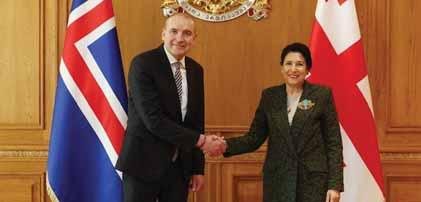
for Europe, because the future of Europe is being decided in Ukraine. The cruel war of aggression must end with the defeat of the aggressor and restoration of sovereignty.
“We discussed the current situation in its humanitarian aspects, and agreed that the most important thing today is solidarity with the people of this country. Iceland, as a founding member of NATO, and Georgia, whose goal it is to integrate into NATO, share the same spirit of Europe for the strengthening of peace, stability and freedom on the continent,” she said.
“Together, we discussed the increased role of security and stability of the Black Sea in the strategy of the alliance. Together with the President, we also discussed in
detail the most difficult situation of the occupied territories of Georgia and the current challenges, such as the new military base in Ochamchire which Russia has announced. The transfer of this property to Russia represents new aggressive steps towards Georgia, and destabilizing steps in the direction of the Black Sea. It is to be appreciated that President Jóhannesson expressed his desire to visit the occupation line and get to know the severe face and consequences of the Russian occupation on the spot," Zurabishvili said. She also noted that she had discussed relations between the two countries and various aspects of these relations with the President of Iceland.
"We discussed global challenges in
terms of climate change, which is the main challenge. This is an area where we can share Iceland’s years-long experience. Iceland has great experience in managing natural crises, and cooperation is important in this regard. We experienced two great tragedies last year, and the experience is very important for us. We also discussed cultural relations," Zurabishvili said. “I believe that there is great potential for cooperation between our countries. The President is in Georgia with a business delegation and I am glad that during the visit, representatives of the business sector of Georgia and Iceland will be able to discuss opportunities and set joint goals.”
During the President of Iceland’s meeting with Prime Minister of Georgia, Irakli Kobakhidze, their conversation touched upon the existing bilateral relations between Iceland and Georgia, and the future prospects of cooperation.
"Issues of sectoral cooperation in various fields were discussed. The importance of further exchange of visits and active partnership on international platforms was emphasized. The attention was focused on the relations between the two countries in the fields of trade, economy, energy and tourism. The necessity of utilizing the potential of cooperation in these areas as much as possible was noted," the after-meeting statement said.
“We are acting like headless chickens” – Marcus Bensmann on Scholz and Germany’s Taurus Dilemma
Continued from page 1
That week started with Chancellor of Germany Olaf Scholz flatly ruling out sending Taurus missiles to Ukraine, stating that it would turn Germany into a party in the war, and in the process apparently violating security protocol by saying that British soldiers are supporting Ukrainian forces in launching long-range Storm Shadow missiles. This was followed by Scholz providing a public counterpoint to President Macron’s remarks that “it cannot be ruled out that NATO troops will be sent to Ukraine,” ruling that out as well, saying that while he was the Bundeskanzler, no German soldier would be sent to Ukraine. Scholz crowned it all with a speech of his own on Thursday, where he said that “Diplomats, instead of grenades, is what we chant to Moscow”, all the while stressing that Germany was the second biggest provider of military aid to Ukraine. And just when we thought everything was said and done, there was a leak of a classified conversation between high-ranking Bundeswehr officers discussing the delivery and usage of Taurus missiles that somehow ended in the hands of the Kremlin.
MARCUS, HOW WOULD YOU DESCRIBE THIS WEEK FOR GERMAN DIPLOMACY, AND THE BUNDESKANZLER IN PARTICULAR?
We have to understand that German foreign policy is facing a huge dilemma. On one hand, Scholz is coming from the Social Democratic Party, and the Social Democratic Party is one of the reasons why Germany build up a dependency on Russia concerning gas, oil and coal for more than 10 years, selling gas storage to Russia and refusing to get LNG terminals, thus depriving itself of an alternative.
Germany’s policy towards Russia since 2014 was one of the reasons why Russia was able to launch this war against Ukraine in the first place, because Russians got the German money. Second, they got the understanding that Germany is not eager to split from Russia, because they are so dependent on the energy
delivery from it.
I'm quite sure that if Putin’s original plan to conquer Ukraine in three or four weeks had worked, then Germany’s political establishment would have said “Oh, it’s bad, but we have to accept the reality.”
But this didn’t happen, so Olaf Scholz had to accept the fact and support Ukraine. First it was helmets, then rocket launchers, then tanks. And we always have the same debate: We do not want to provoke Putin, we don’t want to escalate. Scholz didn’t understand that Putin had already crossed the red line by launching this war. The German Chancellor always thinks “How would Putin react?” We always think: “Oh, we do not want to cross the red line!” But the red line is crossed already! The demand for Scholz is now to show leadership.
Germany should understand that we have to support Ukraine not only because Ukraine is being attacked, and we’re bound to feel compassion, but also because, if Russia is going to win, then we're up next, and if, in the long-term, America is going to leave this continent, then Europe and Germany will fall under the dominance of Russia, and all that we had, all the good things we’ve achieved since the Second World War- the end of the Cold War, all the democracy- all of that security will be gone. Unfortunately, this is not recognized in German leadership.
The most interesting thing, having listened to Putin’s annual address, when he played his game by saying “I will send my rockets to Europe,” is that he did so just to trigger the social democrats in Germany. He then goes on, for more than 80% of the address, about how much money he is giving to build schools, sports facilities, how Russians should procreate more and boost the birthrate. If you read or listen to Putin’s speech, he is not preparing for an atomic Armageddon. He knows the only way he can beat Ukraine, the only strength Russia has, is weakness in the European Union, and the weakness of Germany. And Chancellor Scholz’s weakness encourages him.
When Putin says “Oh, we are advancing in Ukraine!” They are advancing in Ukraine because the Ukrainian army ran out of ammunition, and that happened

because of the weakness of Europe. And Putin is begging the United States, “please, speak with me, we are ready to discuss reasonably”. He's afraid, he doesn’t want to spend more money on weapons. He's under pressure. That’s why he isn’t speaking about the war, he didn’t say: “Now we have to fight for Mother Russia and everything is at stake.” Instead, he says: “Citizens, I will protect you. I will renovate your houses. I will give you sports facilities.” That is his offer. That means he's under pressure. And we are acting like headless chickens, going: “Oooh, he’s talking about atomic bombs! Let’s not help Ukraine as much as we should.”
We should do it, because if the United States under Trump leaves Europe, and we are not able to find a common ground to defend our interests, then we have to accept what Medvedev says, that there will be a Eurasia from Lisbon to Vladivostok.
ON THIS TAURUS DILEMMA - WILL WE SEE THE SAME SCENARIO AS WITH THE LEOPARD TANKS? WHAT WILL IT TAKE?
Courage? Unfortunately, I don't see courage in the government. I would say, if you are not giving Taurus, then at least give ammunition. You have to understand the power of Putin’s logic: Putin is not making compromises. If he sees he’s on a winning
run, he will only make compromises if he is forced to. Everything that Ukraine needs, they should get. If there are some secrets, please, don’t leak them, and please don’t start debates with Macron on the open stage, giving Russia a signal that two main powers on the continent are not on the same page. We already have enough proRussian forces in Europe, there’s no need to encourage them. In short, democracy should learn to defend itself.
ON GIVING THE IMPRESSION THAT EUROPEAN UNITY IS SHOWING CRACKS, I’VE SEEN IT DESCRIBED AS “A LOT OF FOREIGN AND SECURITY POLICY PORCELAIN SHATTERED IN RECORD TIME”. THE THING ABOUT PORCELAIN IS THAT, ONCE SHATTERED, THEN EVEN IF GLUED, IT LOSES MUCH OF ITS VALUE. SO IS THE DAMAGE IRREPARABLE?
I don’t know. I hope not. I would say that if the porcelain is shattered, then go out and buy a new cup and make another tea session. Don’t cry over the spilt milk. But we have to understand that we don’t have a lot of time. That I am sure of. We have some months left where Europe can find itself. If we show weakness, Putin will come out of it as a winner. If we show strength, he will have to retreat. But Putin knows that Germany has this
long tradition of pacifism, and there is always that fear of an atomic Armageddon. Putin is playing on this and he gets resonance [out of Germans] somehow.
I GET WHY PUTIN WOULD WANT TO PLAY THAT CARD, BUT WHY IS GERMANY PLAYING ALONG?
Because Germany has no tradition of defending democracy; it had a tradition of being an aggressor. And then Germans said: “We do not want to repeat that,” and we had three or four generations with an anti-military education and mindset. But now it may decide the future of our continent. We have to defend Ukraine’s democracy, and if they don’t win, we will lose, and we will come under the shadow of Russian fascism. American democracy, I am quite sure, can survive another Trump term. But Europe will not be able to survive if America leaves and we are not able to defend ourselves. I often quote the example of the Spanish Civil War, when France, Great Britain and the United States decided not to support the Spanish Republic anymore, and Franco was able to win with the help of Hitler and Mussolini. That was the beginning of the dark shadow of fascism over Europe. And now we are standing in the same situation with this Russian war against Ukraine. And if we show weakness or cowardice, or panic and choose not to support Ukraine, that will be the price we will have to pay.
WE HAVE SPOKEN ABOUT WHAT’S AT STAKE FOR GERMANY IN THIS WAR, BUT SINCE YOU REPORTED FROM CENTRAL ASIA AND CAUCASUS FOR YEARS, I WANTED TO ASK YOU WHAT’S AT STAKE FOR THOSE COUNTRIES IN THIS WAR?
It's very easy. If Russia wins, they will not be independent states anymore. They might retain their own elections and their own governments, but they will be under the rule of the Kremlin. If Putin were to win in Ukraine, he would be so powerful and Europe so weak, that Russia wouldn’t miss a chance to turn them into client states, like Belarus is today.
GEORGIA TODAY MARCH 8 - 14, 2024 5 POLITICS
Olaf Scholz. Photo by Hollie Adams/Bloomberg
Presidents Jóhannesson and Zurabishvili. Source: IG
Georgia Introduces Amendments to the Law of Georgia on Personal Data Protection
The Parliament of Georgia recently adopted the new Law of Georgia on Personal Data Protection (the New PDP Law or the New Law).
The New PDP Law contributes to Georgia's fulfillment of international obligations and brings existing legislation in the field of personal data protection closer to the European standards. The New Law has entered into force on 1 March 2024.
The New PDP Law introduces several novel amendments that controller or/ and data processor (the Controller or/ and Processor) should consider. The Personal Data Protection Service (the Service), an independent state authority, is responsible for monitoring compliance with the New PDP Law.
NOVEL GROUNDS OF DATA PROCESSING
The New Law introduces additional legal grounds for permissible data processing, such as contractual necessity, protection of important public interests, or investigative purposes. Based on these novel grounds, data processing is considered permissible when it is deemed necessary for either performance or conclusion of an agreement with the data subject or upon explicit request of the data subject. According to the New Law, data processing is also permissible when necessary to perform tasks falling within the scope of public interest as defined by Georgian legislation. These include activities related to crime prevention, investigation, prosecution, administration of justice, detention and imprisonment, non-custodial sentences and probation, operative and investigative activities, public safety safeguarding, protection of the rule of law, including information security and cyber security.
NEW RULES RELATED TO CONSENT OF THE DATA SUBJECT
The New Law determines specific requirements with respect to obtaining consent of the data subject. If the Processor plans to obtain the consent of the data subject with a document that also covers other issues, the Processor is obliged to separate written consent form from other parts of the document and formulate it in a clear, simple, and comprehensible language. Also, if the consent is given within the scope of the agreement, it should be evaluated whether this consent is a necessary condition of the agreement and whether it is possible to receive the relevant service without this consent. As for the processing of special category data (such as data on/ data connected to a person’s racial or ethnic origin, political views, religious or philosophical beliefs, membership of professional organizations, state of health, sexual life, criminal history and others), such data may be processed on the basis of the written consent of the data subject or other enumerated grounds for processing of special categories of data set out in the New PDP Law.
TECHNICAL AND ORGANIZATIONAL MEASURES
TO ENSURE DATA SECURITY
The Processor is obliged to take appropriate technical and organizational measures to ensure the processing of the data in accordance with the New PDP Law. Such measures should adequately ensure data protection, including against unauthorized or illegal processing, accidental loss, destruction and/or damage. The Processor must ensure that technical

and organizational measures are taken to automatically process only the amount of data that is necessary for the specific purpose of the processing. These measures should be applied in such a way that an indefinite number of people are automatically granted access to only a minimum amount of data before a permitted alternative approach is chosen. Furthermore, technical, and organizational measures should be periodically updated according to categories, volume, purpose, form, means of data processing and possible threats of violation of the data subject’s rights.
NEW RULES RELATED TO
DIRECT MARKETING
Under the New Law, in case the personal data is processed for direct marketing purposes, receiving the written consent of the data subject is mandatory. The Controller/Processor should explain to the data subject their right to withdraw their consent at any time in a clear and comprehensible form with the simple mechanism/procedure for exercising this right. The Controller/Processor should also ensure that the data subject has the possibility to request the termination of the data processing for the direct marketing purposes in the same manner as the direct marketing is carried out.
REGULATIONS REGARDING
VIDEO MONITORING
Video Monitoring of the working process and space is permitted only in exceptional cases, if the purposes for video monitoring cannot be achieved by other means or such means are associated with a disproportionately large effort. In the case of video monitoring of the working process and space, the Controller / the Processor is obliged to inform the employee regarding the purpose of video monitoring in writing. Further, in case of video monitoring, the Controller is obliged to define in writing the purpose,
scope, duration and the storage period of video monitoring, the manner, and conditions of access to the video recording, its storage and destruction and the mechanisms for protecting the rights of the data subject in accordance with the principles of data processing. A crucial novelty related to video monitoring is that the warning sign must be installed in a visible place and contain an appropriate inscription, an easily perceptible image about carrying out video monitoring as well as the name and contact data of the Controller.
MANDATORY REPORTING OF INCIDENTS
The New PDP Law imposes the obligation to notify the Service, regarding the occurred incidents of data security breaches. Specifically, the Controller is required to maintain the registry of incidents which describe the incident, its outcome and the measures taken. Each and every incident that may cause significant harm and/or pose a significant threat to fundamental human rights, shall be reported to the Service in writing no later than 72 (seventy-two) hours after the discovery of such incident. As required under the New Law, the Service adopted the order which sets out the rules of reporting and criteria for determining whether specific incident poses harm and/or threat to fundamental human rights. According to the rules published by the Service, the information about the incident shall be submitted to the Service electronically through the official webpage of the Service.
MANDATORY APPOINTMENT OF THE PERSONAL DATA PROTECTION OFFICER
Another notable aspect of the New PDP Law is the introduction of the position the personal data protection officer (the Officer), which comes into effect from 1 June 2024. Appointment of the Officer is mandatory in various sectors such as
public institutions, insurance organizations, commercial banks, microfinance organizations, credit bureaus, electronic communication companies, airlines, airports, and medical institutions and this obligation extends to entities processing substantial volumes of data or engaging in systematic and large-scale monitoring, regardless of specific mention. As required under the New Law, the Service adopted order on the list of persons who do not have the obligation to appoint or designate the Officer. According to this order, there is no obligation to appoint an Officer if the Processor: (i) processes the personal data of less than 3 percent of the population of Georgia; (ii) process the special category data of less than 1 percent of the population of Georgia; or (iii) does not engage in systematic and large-scale monitoring of data subject behavior.
For the purpose of calculating the list of persons whose data is being processed, the employees of the Processor are not counted in (regardless of their number). The Processor who has an obligation to appoint the Officer may meet this requirement through three options: (i) Appointing the Officer; (ii) Adding the functions of the Officer to an employee; or (iii) Outsourcing. The Processor is obliged to publish the identity and contact information of the Officer on its website or through other accessible channels.
RULES RELATED TO DATA PROTECTION IMPACT ASSESSMENT
The New Law introduces the rules on data protection impact assessment, which enter into force from 1 June 2024. If, considering new technologies, categories, volume, purposes, the risk of undermining fundamental human rights and freedoms is highly likely, the Controller is obliged to assess in advance the impact on data protection. Such assessment entails adoption of the document describ-
ing the category, process, purposes of and grounds for Data Processing as well as organizational and technical measures provided for the purpose of data security protection. The data protection impact assessment is mandatory if the Controller makes decisions in a fully automated manner (including on the basis of profiling) or processes special category data of a large number of data subjects or implements systematic and large-scale monitoring of the behavior of data subjects in public gathering places.
SANCTIONS FOR BREACH OF THE NEW PDP LAW
The New PDP Law increases the penalties for breach. Depending on the nature of the breach, the organizational form, and the annual turnover of the offender as well as the existence of aggravating and mitigating circumstances, administrative liabilities may vary from warning to penalty in the amount of GEL1,000 (one thousand) to GEL20,000 (twenty thousand), depending on the nature of the breach of the New PDP Law.
PRACTICAL EFFECT OF THE NEW LAW
Considering the novelties set out in the New PDP Law, the Processors of personal data should review their internal processes, technical and organizational measures and internal documents to ensure compliance with the New Law. Specifically, each Processor / Controller shall: (i) review its internal policies regarding data protection and consent form for obtaining consent; (ii) update these documents as necessary; (iii) create a register of incidents and procedures for notifying the Service; (iv) determine whether it is under obligation to appoint the Office and appoint such Officer no later than 1 June 2024, if applicable; (v) determine whether it is under obligation to adopt the data protection impact assessment and adopt such document no later than 1 June 2024, if applicable.
GEORGIA TODAY MARCH 8 - 14, 2024 6 BUSINESS
Rotational Grazing Takes Root on Iori Plateau: Sustainable Land Management for Biodiversity and Farmers
Progress Achieved in Sustainable Pastures Management & Practical Implementation
BY ANA DUMBADZE
In the picturesque region of Kakheti, Georgia, lies a landscape teeming with biodiversity and unique ecological treasures. However, this natural haven faces a significant challenge – the delicate balance between maintaining a living landscape and the looming threat of desertification. Recognizing the urgency of the situation, the Kakheti Steppes project, implemented by BirdLife partner SABUKO, in collaboration with local communities, is diligently working to protect biodiversity and conserve local species.
Building upon the successes of the previously funded “Restoring Gallery Forest and Grasslands in the Iori River Valley” project, the Kakheti Steppes project places a strong emphasis on the restoration of wildlife habitats and fostering collaboration with the pastoralist community. By reviving gallery forests and grasslands, critical habitats for focal species are rejuvenated, supporting their populations and ecological functions.
Through thoughtful restoration initiatives, such as reforestation and habitat management, the project aims to preserve the rich biodiversity that thrives in these unique landscapes.
The first stage of the project covered the Chachuna Managed Reserve located in Georgia’s Dedoplistskaro municipality, which has faced a severe problem of degradation due to unregulated grazing, while the second phase covers Chachuna, Kotsakhura Range, Samukhi Valley and Vashlovani Protected Area, covering a territory of 25,000 ha in total.
Prioritizing both ecological and socioeconomic wellbeing, a project tackled the revitalization of 25,000 hectares of steppe grassland within the Iori Plateau. Implemented in various stages, this initiative aims to restore land health, promote biodiversity, and empower local communities through sustainable grazing practices.
Various innovative initiatives and methods are being established on the spot to achieve these goals.
Firstly, a robust early warning monitoring system is being established. Through meticulous field studies and data analysis, this system will serve as a vigilant guardian, identifying and mapping areas susceptible to degradation before irreversible damage can occur. This system will be used for different stakeholders before giving land for a lease.
Next, innovative rotational grazing schemes were developed and implemented across the project area. This strategic approach ensures each pasture receives adequate rest periods, fostering biodiversity and preventing overgrazing. Additionally, extensive efforts were undertaken to ensure the active participation and knowledge transfer to local farmers, transforming them into active stewards of the land.
Heavily degraded areas received targeted restoration measures. Cutting grasses, strategically spreading manure, and employing the technique of mob grazing aimed to stimulate plant growth and accelerate recovery. Also, e-fences have been installed. The impact of these interventions was meticulously monitored, providing valuable insights into the effectiveness of restoration strategies.
To guarantee adherence to grazing agreements and ensure responsible land use, a dedicated patrol system was implemented. This system effectively moni-
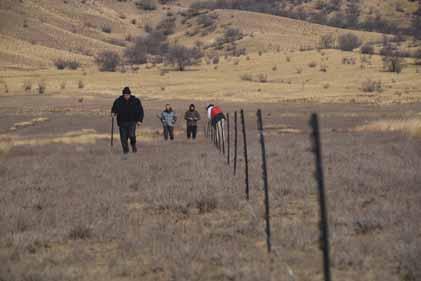
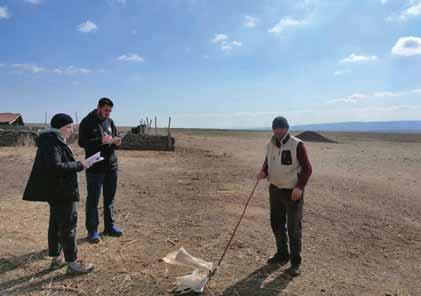
tored compliance and addressed any emerging challenges, solidifying a framework for long-term sustainability.
For more detailed information, GEORGIA TODAY spoke to SABUKO representatives and regional coordinators, who are directly involved in a daily work on the spot, implementing those important measures in practice.
“When you want the best results, it's not enough to follow the beaten track and it's time to experiment,” they note.
Giorgi Chikorashvili, Natural Resource Manager at SABUKO, told us that natural grasslands are vital to local biodiversity, and their damage directly affects the species and their populations, the protection of which is the first and foremost aim of SABUKO.
“For that, we’ve implemented various combined measures,” Giorgi told us, “We decided to install electric fences in the protected area of Chachuna, the protected area of Vashlovani and the multiuse areas of Samukhi. The process is still ongoing. Using electric fences is an ecofriendly and relatively new method in Georgia, which organically fits with the natural environment and is convenient, cheap and “mobile” to use, compared to traditional wire fence. Prior to SABUKO, almost no one in the Georgian market used electric fences, so we ourselves had very little information about its use and benefits, but as a result of research and learning from international experience, we became ‘pioneers’ in this field.
“Initially, we will place a flock of sheep within the fenced area, which will damage the soil by grazing and trampling. Then we will empty the fenced area and, together with scientists and farmers, we will start working on its restoration using different methods.
“When we understand which method or combination of methods contributes
to quick and effective soil restoration, we will transfer this strategy to the degraded soils of Chachuna protected area, Vashlovani protected area and Samukhi multi-use area.
“These areas have been used as winter pastures for ages, but due to the excessive number of sheep, the ecosystem loses its ability to self-restore, which leads to soil erosion. That’s why quick action is now necessary to stop this process and save the unique biodiversity.
“As a result of the measures implemented by SABUKO, the situation in terms of pastures restoration and protecting local unique species has been noticeably improved. Currently, we’re carrying out a socio-economic survey to learn how the introduction of rotational grazing affected local farmers economically, how beneficial it is for them financially, what their needs are, and their opinion about the introduction of rotational grazing. SABUKO also conducted the same type of research last year among 82 farmers, but now we’re monitoring the recent progress in this direction. We’re studying the socioeconomic considerations related to the development of a sustainable value chain. Also, we want to find out the current condition of lease agreements. Subleasing - a lease by the lessee of a pasture to a third person - is a big challenge for us, as it increases the damage and degradation to the pastures due to a larger number of a sheep. Soon, we’ll have the survey results and start analyzing them.
“Constant monitoring of practical implementation of measures, their effectiveness and law enforcement is also an important part of SABUKO activities on the ground. Sometimes, the law on pastures management is not enforced in practice, which leads to uncontrolled grazing and soil degradation. We’re
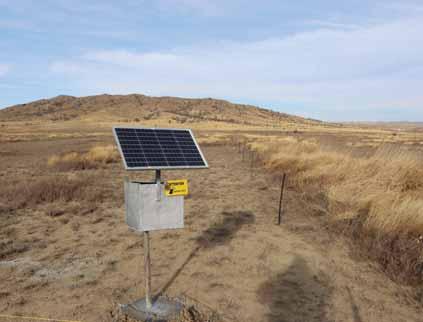
monitoring the situation through various measures, such as by installing mini GPS on sheep to track their route of movement, and seeing how the farmers enforce and follow our recommendations in terms of sustainable grazing.
“As for analyzing the results of rotational grazing in terms of pastures restoration, when it comes to the natural resources and its recovery, this is generally a long-term process and we’re still learning it scientifically. This is a difficult and long process.
“Communication with farmers on an individual level is also of utmost importance. As a result of awareness-raising activities and informational campaigns carried out by SABUKO, now local farmers collaborate with us in terms of enforcing rotational grazing and care more about lands and natural resources restoration. They even help us monitor the situation on the ground, which makes us happy and proud to see results of our intense work.”
Giorgi Khubashvili, a regional coordinator of SABUKO, elaborated on the visible results of installing fences and other measures implemented on the ground.
"If we compare the situation outside and inside the fence, what trees and plants are growing, the result and the difference is striking. Inside the fence, the ground is green, grass grows, and outside, where the sheep move, it is almost no grass," he tells us.
"Also, an early warning system was installed in the risk zones. We communicate with each farmer on an individual level and warn them not to bring sheep and cattle there. Also, we have installed warning banners indicating that grazing is not allowed in that area.
“As it is now winter, the sheep have less feed and farmers have to pay extra to buy feed for them. Our goal is to achieve the result that, in addition to saving biodiversity and growing more grass on the site, they will eventually not have to pay additional costs. The grass coming to their territory will be quite enough to feed their sheep in winter without buying additional feed.
“Once we see the results of the pilot program, both we and the shepherds, already taking into account their consent and great desire, will jointly carry out these measures and gradually introduce rotational grazing on the entire 25,000 hectares.
“Raising the shepherds’ awareness about the importance of rotational grazing and the conservation of natural resources in general has been achieved through individual, intensive communication with them by the SABUKO team,
which is great to see. Now we try together to take care of the environment, because they already understand better that it will be beneficial for them. We visit their farms often, explain the essence of this program, talk about the importance of rotational grazing and sustainable pasture management, which obviously increases their trust and awareness of the issue. As a result of our communication, they are more careful about the environment. They try not to have more sheep than is allowed for the area.
“It is also important to introduce a patrolling system so that the achieved results can be maintained and constantly monitored. The winter season is especially difficult and time-consuming in this regard, because many new shepherds are needed during this period, and many of them may not know how to behave and how to graze sheep in a way that takes care of natural resources and the environment. That is why our team is in constant contact with them and actively monitors them. We warn everyone and explain how they should behave."
Another regional coordinator of SABUKO, Rezi Kvaratskhelia, told us that the results of the organization’s activities are still being studied, as it takes time to see the difference, however, he noted, the achieved progress and results are promising.
“We work constantly with farmers, conduct interviews with them to learn more about their needs, we try to improve their well-being along with restoring natural resources. Fortunately, they see and appreciate it. Installing electric fences on the ground at their request is also proof that our pilot project has been justified, timely and successful. We, the SABUKO team, continue to work actively and spare no effort to preserve the unique local biodiversity, which is crucial work and valuable thing for Georgia’s biodiversity, for generations to come,” he explained.
Recognizing the crucial role of education in empowering future generations, a specialized range land management course was established at Ilia State University. This academic offering equips students with the necessary knowledge and skills to become champions for sustainable land management practices, ensuring the continued success of the project's goals beyond its immediate timeframe.
By prioritizing ecological restoration, engaging local communities, and fostering long-term knowledge transfer, the initiative has paved the way for a flourishing future for the Iori Plateau, its diverse ecosystems, and its inhabitants.
GEORGIA TODAY MARCH 8 - 14, 2024 7 BUSINESS
EU-Supported Reforms Help Reduce Energy Poverty in Georgia
Following the signing of the Association Agreement with the EU in 2014, alignment with the EU regulatory framework became a key driver of energy sector reforms in Georgia. The reforms have targeted various aspects of energy sector development, including renewable energy, energy efficiency, competitive markets, and protection of consumer rights.
One of the key issues of energy sector reform is the fight against energy poverty. The phenomenon, defined as the inability of households to access essential energy services and products, remains a major challenge in Georgia.
To learn more, GEORGIA TODAY interviewed Tutana Kvaratskhelia, a senior energy policy analyst and energy poverty researcher at the think tank World Experience for Georgia (WEG). WEG recently published a study on understanding energy poverty in Georgia.
COULD YOU GIVE US AN OVERVIEW OF THE REFORMS THAT HAVE BEEN IMPLEMENTED IN THE ENERGY SECTOR, INCLUDING THEIR OBJECTIVES AND IMPACT ON THE GEORGIAN POPULATION?
Georgia’s energy sector has undergone a significant transformation since the 1990s. We remember the days when electricity was available for only 3-4 hours a day, the energy infrastructure was deteriorating, and security and reliability of supply were a major concern.
As a result of the reforms implemented, the situation has gradually improved and, according to many assessments, Georgia now has a stable and reliable energy sector. However, challenges remain and efforts to address them are ongoing. Currently, the main framework for energy sector reforms is the Association Agreement with the European Union and membership in the Energy Community. Under these agreements, Georgia is working to transpose European directives and align its legal framework with EU legislation.
This process not only facilitates the country's accession to the EU but also plays a crucial role in strengthening Georgia's energy security. Reforms in this regard cover various aspects, including the development of renewable energy and energy efficiency, the establishment of competitive energy markets, the protection of consumer rights, etc. Reducing energy poverty and improving access to clean energy sources while ensuring affordability for the population is one of the key priorities of the reform agenda.
COULD YOU PLEASE EXPLAIN IN MORE DETAIL WHAT ENERGY POVERTY IS, HOW IT MANIFESTS ITSELF IN GEORGIA, AND WHAT THE SPECIFIC CHALLENGES FOR THE POPULATION ARE?
Energy poverty is the lack of access to essential energy services required for human well-being and health. This includes not only electricity, but all forms of energy used by households for heating, cooking, and other daily needs. Research shows that inadequate heating and the use of polluting fuels and technologies are linked to a range of illnesses and have an impact on a country's health and education systems and overall economic development.
In Georgia, as in many post-Soviet countries, several factors contribute to energy poverty, including an outdated and energy-inefficient building stock, a significant portion of the population facing social vulnerability, inefficient energy technologies, and so on. As a result, the energy services used by households are inefficient, exposing Georgian house-
holds to high energy bills and a massive problem of underheating.
According to the Geostat data, households in Georgia predominantly rely on individual heating facilities (81%) or on a central heating system at the apartment level (25.6% in urban areas and 6% in rural areas). The main sources of heating are natural gas and firewood. Specifically, 35.4% of all households use firewood for individual heating, with the majority (86.1%) of these being rural households. Wood is burned in traditional, inefficient stoves, contributing to indoor air pollution and related health effects. In addition, to cope with high heating costs, households often reduce their living space in winter, heat only one room, or maintain temperatures below the WHO-recommended minimum of 18°C. Many aspects of energy poverty remain hidden due to a lack of research and awareness.
HOW CAN RESEARCH ON ENERGY POVERTY CONTRIBUTE TO ADDRESSING THE PROBLEM, AND WHAT ARE THE APPROPRIATE METHODS FOR DIAGNOSING IT?
Solving any problem starts with identifying and analyzing it. Energy poverty is a multifaceted problem, intertwined with the socio-economic characteristics of the population, energy markets, energy efficiency of buildings, access to clean fuels and technologies, etc. A proper understanding of the causes of energy poverty helps governments to develop effective and targeted policies to alleviate energy poverty. However, measuring energy poverty is not an easy task. The characteristics of energy poverty in Georgia are different from what is generally known about energy poverty in Western Europe. After the COVID-19 pandemic and Russia's invasion of Ukraine, which led to subsequent energy crises, rising energy tariffs became a crucial issue in terms of energy poverty in the EU, but energy prices are not a central issue in Georgia. Tariffs in Georgia are not based on market principles, and they are kept at a low level to reflect the country's social situation. While this strategy poses challenges for sector development, it is an issue that deserves a separate discussion. Getting back to energy poverty, we have different vulnerabilities. As I mentioned earlier, many households in Georgia still rely on technologies that create problems, such as indoor air pollution, partial heating of homes, and limiting heating to a limited number of hours per day for many households. Accordingly, the fact that the energy costs of the population may not be high does not mean that we do not have energy poverty; on the contrary, we are facing more severe forms of poverty. It is therefore crucial to consider national specificities when diagnosing energy poverty.
IN YOUR OPINION, IN WHAT WAYS WILL THE EUROPEAN UNION BE ABLE TO HELP GEORGIA IN THIS DIRECTION?
The European Union can assist Georgia in several ways. First, the EU can provide technical assistance and expertise to support Georgia's efforts to improve energy efficiency and promote renewable energy sources. Georgia does not have any substantial fossil fuel resources, and almost 100% of its natural gas and oil is imported, but we have great potential for renewable energy sources such as hydropower, solar, wind, etc. This positions Georgia as a valuable partner for the EU in terms of transit or export of renewable energy (after the Black Sea submarine cable project is realized).
The EU Renewable Energy Directive has already been transposed in Georgia.
The Law of Georgia on Promotion of Production and Use of Energy from
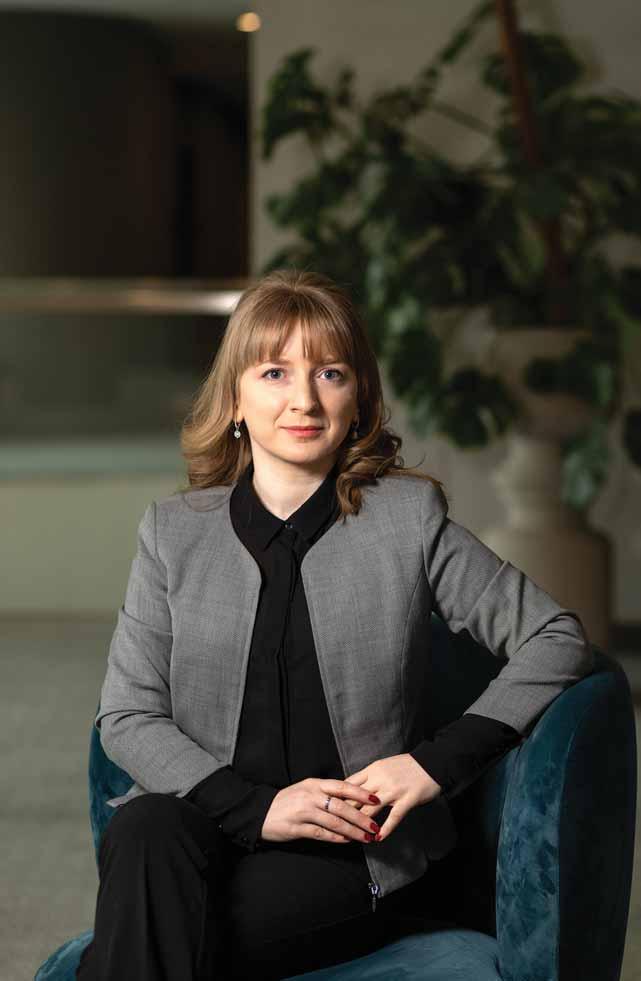
Renewable Sources was adopted in 2019.
The development of renewable energy will provide the population with access to clean energy sources. In the EU, energy communities play an important role in the energy transition and the fight against energy poverty; these are collective and citizen-led energy actions where individuals can come together to own small power plants. These plants would generate electricity for their own use, with any excess energy sold to the grid. In Georgia, the first steps are being taken to develop the legal framework for this. Second, the EU can offer financial support through various funding programs to implement energy poverty alleviation measures. Georgia has made significant progress in terms of transposing energy efficiency-related directives, with the regulatory framework almost fully in place. In 2023, a new regulation came into force that requires all new buildings, with few exceptions, to meet minimum energy efficiency standards. There are
also plans to develop a strategy for the renovation of existing buildings. Currently, most buildings in Georgia lack proper insulation, resulting in high costs for heating and other energy services. EU directives require countries to assess the number of households living in energy poverty and to include measures to address this issue in their integrated energy and climate plans (NECPs). Georgia has already drafted its first NECP with measures to address energy poverty. These include programs to increase access to clean energy sources and technologies, financial support to the population to cover energy bills, etc. Longterm measures in terms of building renovation are still missing, but it is expected that after the development of the long-term renovation strategy, the new programs will be introduced with the help of the European Union and related donor organizations.
In addition, the EU can facilitate the exchange of knowledge and best prac-
tices between Georgia and EU Member States to enhance Georgia's capacity to address energy poverty.
WHAT IS YOUR ORGANIZATION'S ROLE IN THIS PROCESS? TELL US ABOUT YOUR PLANS FOR THE FUTURE.
WEG is an independent think tank working in several areas beyond energy poverty research, such as energy security, sustainable development, and related issues. We are actively involved in ongoing reforms through advisory support, monitoring, and analysis. We cooperate with public authorities, other analytical centers, and international organizations in the field of energy and sustainable development. We see European integration as crucial for the country's development and for improving the well-being of its citizens. We will continue to support evidence-based decision-making and the development of inclusive policies.
GEORGIA TODAY MARCH 8 - 14, 2024 8 SOCIETY
The Book ‘The Caucasus - 80 Beautiful Hikes’ Commemorates the Region’s Secluded Hiking Trails
BY SHELBI R. ANKIEWICZ
To commemorate and draw attention to the lesserknown hikes and trails in the Caucasus region, a new book, ‘From Elbrus to Ararat, The Caucasus - 80 Beautiful Hikes’ highlights spots to visit in Turkey, Azerbaijan, Armenia, and Georgia.
Richard Baerug, a Norweigan with many titles, among them hiker, skier and author, moved to Svaneti years ago after falling in love with the region. He runs the Ushba Grand Hotel located in Becho village. Baerug was inspired to write ‘The Caucasus - 80 Beautiful Hikes’ after he had lived in Georgia a while and really discovered the Caucasus, feeling there were better places to hike than the traditional tourist spots.
“I write about the greater possibilities, because I believe many hikes are more beautiful [than those traditionally offered], and you have this unique opportunity to be at one with nature. If you’re not afraid of nature, why go where everybody else goes?” Baerug says.
The book had its launch party on March 1 with the National Trust of Georgia. The National Trust is an organization that was adopted after the British model and aims to save and restore historical sites within the country to preserve the buildings or land for generations to come. These sites are then turned into tourist venues or workspaces for people to use.
All the hikes depicted in the book were personally hiked by Baerug, and he took many of the photographs included. Each hike has a legend paired with it, and includes difficulty levels, the time it takes to complete, elevation level, and GPS data. Additionally, Baerug included where you could go wrong on the trails and how to find your way back, because he felt most guides do not explain what to do if someone has wandered off the path. He also includes some tips about things
he should have done when hiking the paths, so others can be prepared when they go.
“Recommenders don’t always write about what they did, but also what they didn’t do,” Baerug notes.
Even though the book is a guide to hikes in the region, it also includes other standpoints, such as short stories, historical attributes, tips, and nature evaluations. In the book, Baerug describes the various flowers in the Caucasus and the colors of the trees and forests during different seasons. Since he lives in Svaneti and has a natural draw to that area of Georgia, he said 1/3 of the ‘Georgian Hikes’ are in Svaneti.
While presenting, he said he has met several interesting people in Svaneti, whom he wrote about in the book. He features interactions with a family on a farm and how they live, a famous ‘Svanetian milker’, and the story of a nun who is single handedly renovating a church.
Baerug also noted that in the book he wrote a lot of information about Kazbegi from a cultural standpoint.
During the book launch, he told the story about the beginning of time, how Georgia is considered land given by God, and that the location of the Garden of Eden is said to be near Svaneti, the ‘epicenter of the world.’ Baerug also told the story of Armenia and how in the year 301 AD they became the first Christian
country in the region, because of their king, who turned to religion to be healed.
Baerug also writes about the geography of the Caucasus and whether it is considered Europe or Asia, the fact that there are at least 50 languages spoken within the region, and useful phrases to use in the local languages when visiting these countries. He said he couldn’t include as many hikes as he would have liked in Azerbaijan because of the land restriction. That is why there are a minimal number of hikes for the country –he flew there once and could only complete so many.
Other people in attendance at the event included Peter Nasmyth, author and contributor to the National Trust of Georgia, who spends his time between London and Georgia. He expressed his regard for Baerug during the launch by explaining that most people just come to places, such as Georgia, to visit, but Baerug is an exception.
“No one could have done it better,” said Nasmyth. “He’s one of the expats who didn’t just come to the country, he did something. He built something.”
Baerug first visited Georgia as a tour guide for a company he was working for. He stepped in for a job in Kazbegi and had to memorize all the plants, animals, trees, etc. to explain to those who joined the hike. Since he was taking someone’s place, he learned in one day what a tra-

Niko's Band
BLOG BY NUGZAR B. RUHADZE
It was truly difficult to imagine: 300 million aggregate hits in worldwide social network; the YouTube alone with almost 40 million views in just six months. And guess who? Niko’s famous band with singers Manu Murghulia, Amiko Chokharadze, Nanuka Porchkhidze, Niko Nanitashvili himself, piano and music director Davit Porchkhidze, and the idea and production by Zviad Bliadze. The song that has made them so uncannily likable and famous is titled ‘Georgian Disco’, released on November 23, 2023, and based on the original Italian song ‘Italo Disco’, a song by Italian rock band the Kolors, which hit the airwaves May 5, 2023.
What seems most incredible is that the Georgian version of this immensely amusing pop song has outclassed, outdone and out-beaten the overly popular Italian vocal piece. On top of that, the Georgian version of the hit song was ranked number 15 in the most famous in the world search list of the British origin Shazam, an application that can identify music based on a short sample played using the microphone on the device. The Georgian cover of Italo Disco, named Disco Farisco, alias Kartuli (Georgian) Disco, went viral online, having become one of the strongest hits on TikTok. The Georgian musicians, having
slightly modified the rhythm and melody of the original music, came up with the jovial version of the Italian song, singing away about the world-famous celebrities visiting Tbilisi, who could never be better than the Georgian disco. They also humorously praise the Georgian Khachapuri, giving it a lovely preference over Italian Pizza.
Niko’s Band was born in the musical depths of PosTv, the television station singlehandedly created several years ago by the well-known old-timer of the Georgian media world Shalva Ramishvili, as another internet TV outlet, and developed into a huge system of newscasting and entertainment. The naturally talented and relevantly educated young men and women employed by this channel successfully keep up the high standard of both journalism and showbusiness. It was exactly this kind of background that tossed their beloved Niko’s Band into the international orbit of arts and entertainment.
Niko Nanitashvili himself is a typical self-made man, one who has used all his talent-ridden capacity to the fullest extent, starting out as an anchor of PosTv and finally creating his own entertainment evening show. Certainly, Niko couldn’t have done his great job without the imaginative and exceptionally creative action of Zviad Bliadze, the experienced producer, director and stage personality himself.
Manu Murghulia, at 20, has already become a star of Georgian showbiz. This
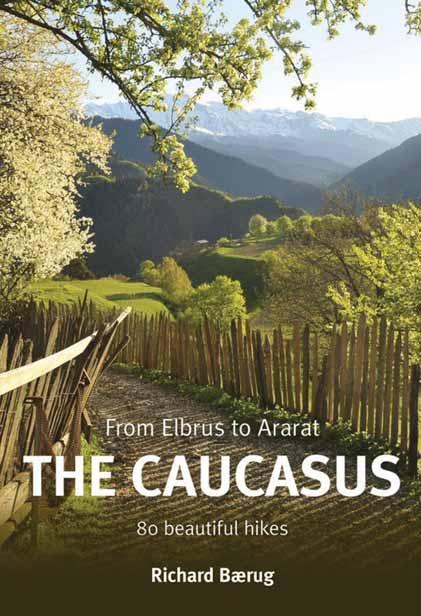
ditional guide would learn in a week.
Then, in 2009, he came back to Georgia as a part of a summer course. The group was on schedule to visit Svaneti, but the trip was canceled due to inconvenient weather conditions. However, he heard Georgians telling stories about Svaneti and how wonderful it was, that he couldn’t forget, and scheduled another trip to Svaneti later that year.
While he was on a hike, his guide talked about his family and how they had moved from their house in the late 80s and wanted to convert it into a hotel, they were just waiting for a sponsor. Baerug saw this opportunity and took it, which led him to where he is today.
The Ambassador of Norway Bergljot Hovland was also at the event. She described Baerug’s book as “Not only the life of the mountains, but the façade of lives.”
With this book, Baerug hopes to model what will happen in the future based on the past ten years. He shared his hopes to send people in more directions in the Caucasus regarding hikes, so that instead of not seeing anyone, people can see two to four people on their hikes. Right now, if a person were to hike 90% of the trails Baerug listed in his book, there would be no one around, however, Baerug hopes that percentage will get down to 70% within the next ten years.

fiery young talent is everywhere, including Irma Sokhadze’s noon show on PosTv, where she figures as one of the anchors of the popular program. Moreover, the lady has been accepted by the prestigious Berkley music school, having won a 50% scholarship. Incidentally, Manu started singing when she was only one year of age.
Nanuka Potchkhidze, another female singer of the band, has totally charmed the audience with her style and timbre. Both girls are clearly promising, with every single quality needed for stardom.
Amiko (Amiran) Chokharadze, the
second male singer of the group, is a genuine bouquet of versatile art form and content. He can sing and dance, he is a great comedian, a perfect anchor, and an outstanding showman of major caliber.
Travelling beyond the boundaries of their native country, these four boys and girls make a memorable bunch of vocal and choreographic actors and actresses, who can successfully rank on any level of entertaining arts in the world, pleasantly amazing the international audiences all over the place.
When things like this happen in this
country, a stray thought comes to mind, which would surprise some of us, but might also trigger some useful contemplation on our wellbeing. Just imagine if all those talents in Sakartvelo were duly commercialized all over the planet, how many times the state budget could grow provided they were marketed properly and in good time. Niko’s Band is just one lucky case of the kind. Potentially, there are many, many more, either openly or latently, and all of them have a sizable chance to turn their talent and creativity into wealth. Not easy of course, but no pain means no gain.
GEORGIA TODAY MARCH 8 - 14, 2024 9 SOCIETY
Richard Baerug reading one of his previous books. Source: Agenda.ge.
Book cover. From Elbrus to Ararat, The Caucasus - 80 Beautiful Hikes
Georgian Disco. Source: PosTV/Youtube
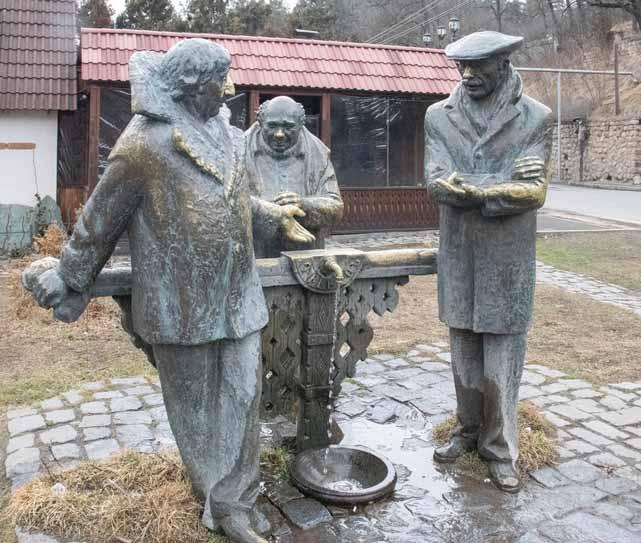
Around Armenia
BLOG BY TONY HANMER
Following my interlude in Svaneti, I want to return to writing more about Georgia’s southern neighbor, which my wife and I visited in February.
Part 1 looked at Yerevan, the capital; now we shall go further afield.
We were staying with our great Iranian friend, who showed us around the city, and we really wanted to take him and another friend from Iran outside for a day excursion. Lake Sevan was the first stop.
This lake is the largest in the country, and famous for its trout; it’s also extremely popular as a swimming destination in the hot summers this country has.
As we were being driven through the Armenian countryside, I remembered one of my most powerful impressions of this little country: stone everywhere.
Fields of it, others cleared, with piles of stones on their edges and being used for farming. The backbreaking labor involved I could hardly imagine, especially as I thought that the seasonal temperature extremes Armenia is known for would likely continuously see more and more rocks being slowly pushed up to the surface from below. Think you’re done? Wait, here’s another few tons of presents for you! But the Armenians also make good use of all this building material, of course.
Sevan appeared, almost deserted at this cold time of year, and we released our taxi and had a look around. The very first church we entered in the country, on a hill overlooking the lake, proudly bears a plaque stating its date of original building: 305 AD. Only four years after the country adopted Christianity as its
official religion, and at least a century older than any church in Georgia. They wasted no time.
True, the church had been devastated at least once by earthquake, then rebuilt. But original dates are important. Its dark gray tuff stone walls and cupola had been lovingly, painstakingly restored, and it was active. Inside, candles burned. Outside were lines of khachkars, another
notable feature of Armenia. These are flat slabs of stone carved with very intricate crosses which bring to mind similar, though younger, work in the Celtic parts of Britain.
We walked around a bit, then took another taxi through high snow-covered hills to nearby Dilijan, with its beautifully built old town, and some artisans working and displaying their wares. Here,
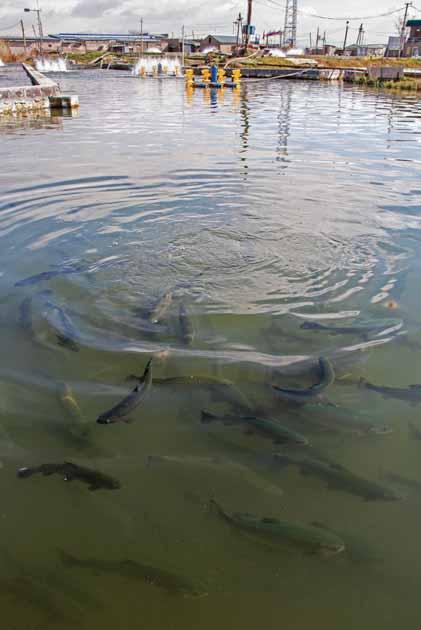
we had a sumptuous lunch. I’ll not get into those items which were strictly Armenian and those which are common to the Caucasus and wider which originated exactly here. There was also a bronze statue of the three main heroes from the famous Soviet-era comedy film, Mimino, much beloved by people from all three Transcaucasian republics. One more main outing was on our cards





before we returned to Tbilisi. Friends of our Iranian friends took them and us to Vanadzor, a mountain village, to meet still more Iranians, of which there are many here. These were all students at a school for Christian theological education, and this was their graduation ceremony, a most joyous occasion. Iranian Christians have much more freedom to be themselves here, with the Shiite regime oppressing them back home. We stopped on the way to get some photos in the snow, which still persists at the end of winter; then was the ceremony and dancing and a feast. We headed back to Yerevan after midnight, but we had known how long the journey would be, and were prepared, with nothing on next morning so we could sleep it off.
Our driver runs a trout farm just outside Yerevan, and we met him there before this trip. In the distance loomed wonderful Mount Ararat, alas in Turkey. Huge nest after nest of stork pairs towered into the sky on the tops of electrical and other poles. Armenia did, after all, offer many unique sights, not just things to compare to their equivalents in Georgia or elsewhere. Soon, it was time to return to Tbilisi, and we were most grateful for this break in another land close by. There is still so much more to see in Armenia, but this was a good next step for both of us.
Tony Hanmer has lived in Georgia since 1999, in Svaneti since 2007, and been a weekly writer and photographer for GT since early 2011. He runs the “Svaneti Renaissance” Facebook group, now with over 2000 members, at www.facebook.com/groups/ SvanetiRenaissance/ He and his wife also run their own guest house in Etseri:
www.facebook.com/hanmer.house.svaneti



GEORGIA TODAY MARCH 8 - 14, 2024 10 SOCIETY CARRENTAL+995599787478 ToyotaPradoMercedesViano 55$50$70$ MercedesSprinter
Turkish Embassy Organizes Mosaic Art Exhibition
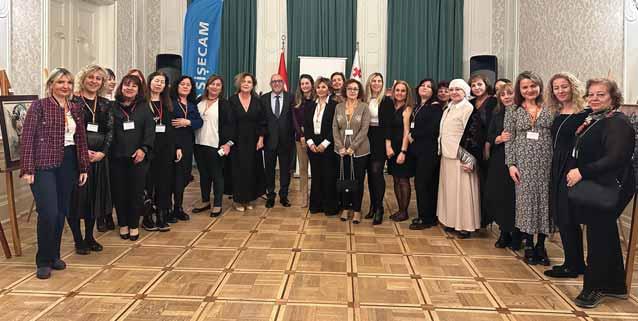 BY EREKLE POLADISHVILI
BY EREKLE POLADISHVILI
To celebrate the upcoming International Women’s Day and the work of talented Turkish women, the embassy of the Republic of Türkiye organized “Fragments to Harmony: Mosaic Ensemble” exhibition at the Writers’ House, on 1-2 March. The exhibition featured a diverse selection of glass and stone mosaic works made by Dilek Türk and her atelier.
Government officials, members of diplomatic corps, as well as representatives of NGOs and cultural figures attended the opening ceremony, which was followed by a reception, hosted by H.E. Ambassador of the Republic of Türkiye to Georgia, Ali Kaan Orbay.
The Ambassador gave a speech in which he talked about meaning of mosaics in our life.
“Beyond its aesthetic appeal, mosaic art serves as a powerful symbol of unity and harmony, where individual pieces come together to form a tapestry of collective expression. For me mosaics represent life itself,” he said.
He Ambassador also suggested that mosaics symbolize the relationship between two friendly countries.
“As two nations of deep history shaped by diverse and colourful cultures, our countries today are the embodiments of the art of mosaic. Türkiye and Georgia are two outstanding examples of nurturing unity, harmony and peace from many a different culture and persuasion”.
In his speech, Ambassador Orbay thanked Ms. Dilek Türk and her atelier for sharing all the beautiful works with the audience. His excellency also underlined a role of the support of the Ministry of Culture and Sports of Georgia and of Mina Glass / Sisecam.
Dilek Türk in turn addressed the audience and expressed her gratitude to Ambassador Orbay, as well as repre-
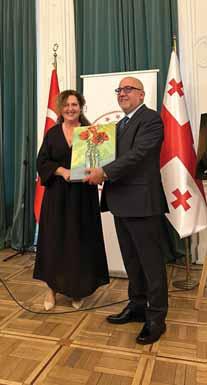
sentatives of the Ministry of Culture and Sports of Georgia and distinguished members of diplomatic corps.
In her speech, Ms. Türk talked about the support and encouragement her atelier receives from the Turkish Embassy.
“It is through such collaboration and shared appreciation for art that we are able to showcase the beauty and richness of mosaic art to a wider audience on the occasion of International Women’s Day,” she said.
Ms. Türk also talked about her history as an artist and how her friends from the atelier had created all the beautiful mosaic works.
“I have been painting since I can remember, and throughout my professional life, I have continued to paint and exhibit my works. The talented women who created these mosaics are not only my friends with whom I’ve been working with for many years, but newcomers as well”.
This two-day mosaic art exhibition is a good example of how much the Turkish Embassy cares about improvement of cultural relationship between two countries.
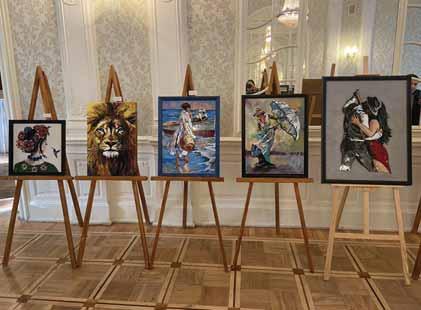
PUBLISHER & GM
George Sharashidze
COMMERCIAL DEPARTMENT
Commercial Director: Iva Merabishvili
Marketing Manager: Natalia Chikvaidze
EDITORIAL DEPARTMENT:
Editor-In-Chief: Katie Ruth Davies
Journalists: Ana Dumbadze, Vazha Tavberidze, Tony Hanmer, Nugzar B. Ruhadze, Mariam Mtivlishvili, Erekle Poladishvili, Shelbi R. Ankiewicz
Photographer: Aleksei Serov
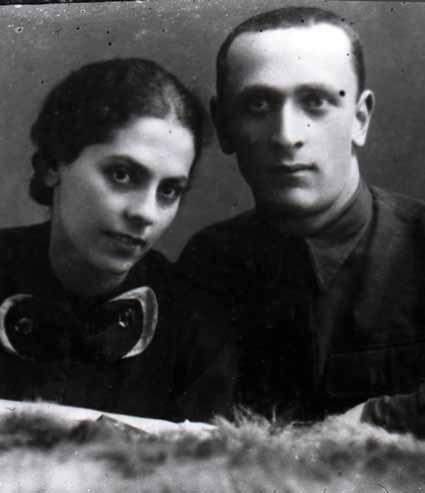
Georgian
Poets: Lado Asatiani’s “In Georgia”
TRANSLATED FROM GEORGIAN BY
KETEVAN TUKHARELI
Vladimir Asatiani, affectionately known as Lado, was a renowned Georgian poet born on January 14, 1917, in Kutaisi. Despite a short poetic career spanning just seven years, he cemented his place as one of the most cherished poets of 20th-century Georgia.
Raised in a family of educators, Lado completed his early education in his hometown of Bardnala before pursuing studies at the Tsageri Agricultural Technique and later enrolling in the Kutaisi Pedagogical Institute. His poetic journey began with the publication of his first poem, "თებერვლის დილა " (Morning of Spring), in the Kutaisi newspaper Stalineli in 1936. In 1938, Lado relocated to Tbilisi, where he found employment at the newspaper "ნორჩი ლენინელი" (Norchi Lenineli), situated opposite the opera house. It was in Tbilisi that he met Aniko Vachnadze, his future wife, who worked as an economist in the writer's union. When adulthood brought the onset of tuberculosis, an incurable condition at the time, Lado often sought respite in the fresh air of the mountain village of Abastumani. Despite temporary relief, his inability to climb Tbilisi’s hilly streets led his wife to secure lodgings at the "Orient" hotel in Tbilisi. Their flat had a view of Lado Gudiashvili's residence. Lado expressed a desire for his book to be decorated with Gudiashvili's artwork,
a wish his wife passed on to Gudiashvili’s wife. But it was a wish that was only able to be fulfilled posthumously, seeing Gudiashvili painting Asatiani's portrait on the poet's book following his passing.
IN GEORGIA, BY LADO ASATIANI
In Georgia were born And then always Troubled about that; Eh... I wish our Childhood and beauty Even for an instant, Came back.
The Georgian will not Kill himself, no, He may be killed In the fight with One hope: let our life be lengthened And repeated Once more.
Bravery comes to us
From our ancestors, Let everybody learn And know about that!
We may die in The fight, but Even then, we Don't part with Life.
As life, thus is living, Close all doors Of death and Long live that Happy day, when We were born On this earth!
Website Editor: Katie Ruth Davies
Layout: Misha Mchedlishvili
Webmaster: Sergey Gevenov
Circulation Managers: David Kerdikashvili, David Djandjgava
ADDRESS
1 Melikishvili Str.
Tbilisi, 0179, Georgia
Tel.: +995 32 229 59 19
E: info@georgiatoday.ge
F: GeorgiaToday
ADVERTISING
+995 555 00 14
E-mail: marketing@georgiatoday.ge
Reproducing
GEORGIA TODAY MARCH 8 - 14, 2024 11 CULTURE GEORGIA TODAY
SUBSCRIPTION
&
46
material, photos and advertisements without prior editorial permission is strictly forbidden. The author is responsible for all material. Rights of authors are preserved. The newspaper is registered in Mtatsminda district court.
# 06/4-309
Reg.
Lado Asatiani and his wife. Source: Iverieli







 Source: Reuters
COMPILED BY ANA DUMBADZE
Source: Reuters
COMPILED BY ANA DUMBADZE
 BY KATIE RUTH DAVIES
BY KATIE RUTH DAVIES

























 BY EREKLE POLADISHVILI
BY EREKLE POLADISHVILI



